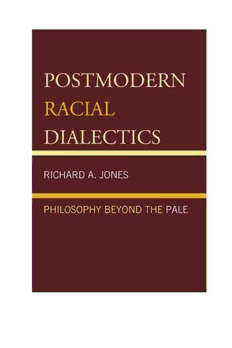
Postmodern Racial Dialectics: Philosophy Beyond the Pale PDF
Preview Postmodern Racial Dialectics: Philosophy Beyond the Pale
Postmodern Racial Dialectics Philosophy Beyond the Pale Richard A. Jones UniversityPressofAmerica,®Inc. Lanham•Boulder•NewYork•Toronto•Plymouth,UK Copyright©2016byUniversityPressofAmerica,®Inc. 4501ForbesBoulevard,Suite200,Lanham,Maryland20706 UPAAcquisitionsDepartment(301)459-3366 UnitA,WhitacreMews,26-34StannaryStreet, LondonSE114AB,UnitedKingdom Allrightsreserved PrintedintheUnitedStatesofAmerica BritishLibraryCataloguinginPublicationInformationAvailable LibraryofCongressControlNumber:2015950950 ISBN:978-0-7618-6680-0(cloth:alk.paper)—ISBN:978-0-7618-6681-7(electronic) TMThepaperusedinthispublicationmeetstheminimumrequirementsofAmerican NationalStandardforInformationSciencesPermanenceofPaperforPrintedLibrary Materials,ANSI/NISOZ39.48-1992. Formyteacher AlisonM.Jaggar Contents Acknowledgments vii 1 Introduction 1 2 PhilosophyforUsbyUs:PhilosophyFUBU 19 3 TheValueofAcademicPhilosophyforBlackFolks 37 4 DiseasesoftheImagination 59 5 ThePoliticsofBlackUtopia 71 6 ProlegomenatoAnyFutureMoralPhilosophy 109 7 HorrorismintheTheaterofCruelty 147 8 TheTechnologyofImmortality,theSoul,andHumanIdentity 179 9 RacialAuthenticity 199 10 PostmodernRevolutions 229 Index 253 v Acknowledgments I would kindly thank Rosanna Marie Neil, Patrick Gooden, and J. Everet Greenforreviewingandprovidinghelpfulcommentaryonthiswork.Rosan- na Marie Neil, one of my brilliant former Howard University students, and Harvard University Law School graduate, provided a comprehensive and exhaustive analysis of this book. Her suggestions helped clarify many con- ceptualpointsthatotherwisemighthaveremainedinaccessibletoreaders.In thedialecticalprocessesbetweenteacherandstudent,itisgratifyingtohave my work critiqued by a kind and insightful student. The book is better be- causeofhersympatheticeditingandinstructiveremarks.ProfessorJ.Everet Greenprovided detailedcommentary onthetext andwished that I hadbeen more “authentic” in telling my own story—more “me”—less canonical Western philosophy: more like Ta-Nehisi Coates’s Between the World and Me, less like Michel Foucault’s The Order of Things. Dr. Green’s exquisite critiqueremindedmeofmytendencytoobscurantismandprolixity;thatone criterion of great art is simplicity. Dr. Green also helped me understand my own biases in over-estimating the value of academic philosophy. Patrick Goodin, Chair of the Philosophy Department at Howard University, dis- agrees with me on my estimations of the value of “philosophical” Marxism asanantithesistocontemporarycapitalism.Hesuggeststhatcapitalism,like Marxism, has changed so much that they cannot be so simply opposed. However, Dr. Goodin, who heard me present several of these papers at Ho- ward University conferences, and read others as they were originally pub- lished, also believes that presented together as they are here, these essays formaunitedmereologicalwholethattheylackwhenreadapart. Beyond their helpful comments, I would also acknowledge the reviwers’ continued interest in my work, intellectual encouragement and support, and many personal kindnesses. My wife, Carol Jones, carefully read and copy- vii viii Acknowledgments editedthemanuscript.Withouthermanyinsights(andlove)thisbookwould nothavebeenpossible.Iwouldalsoliketoacknowledgeandthanktheeditor of Wagadu, Mecke Nagel, for the interest she has shown in my work and permissiontoinclude“TheTechnologyofImmortality,theSoul,andHuman Identity,” a version of which first appeared in Wagadu Volume 4: Intersect- ingGenderandDisabilityPerspectivesinRethinkingPostcolonialIdentities, Xlibris,2008,pp.86-98.HarryvanderLinden,editoroftheRadicalPhilos- ophyReview,hasalsograciouslypermittedmetouse “ThePoliticsofBlack Fictive Space: Utopian Archetypes,” from Radical Philosophy Review, Vol- ume12,Numbers1-2,2009,pp.391-418,and“BlackAuthenticity/Inauthen- ticity and American Empire,” from Radical Philosophy Today, Vol. 4, No- vember 2006, pp. 195-210. The first paper appears here as chapter 5, “The PoliticsofBlackUtopia,”andthesecondaschapter9,“RacialAuthenticity.” Postmodern Racial Dialects is also a subjective—mentally internal—di- alogue between my own racially inflected conscious history of books and ideas,withmycurrentknowledgeandexperienceofracializedreality.Inthis “tertiary”—meta-level—discoursebetweenmyyoungerandpresentselves,I attempttomediatemylivedexperiencesof1950’ssegregationismwithcon- temporarydiscordancesoffauxintegrationism.Further,asatrainedacadem- icanalyticphilosopher,Iapplythedisciplineofanalysisantitheticallytothe art,literature,andphilosophyoftheblackexperience.Theserichsyncretisms create“possibilities”for“thinkingtheimpossible,thetitleofGaryGutting’s book on modern French philosophy. Gutting contends that Gilles Deleuze, JacquesDerrida,andMichelFoucault’sengagementswithAnglophoneana- lytic philosophy were attempts to “think the impossible.” Similarly, Post- modernRacialDialectssituatesitself“beyondthepale”ofWesternphiloso- phy. Are global hopes for human equality and equity thinking the impos- sible? Is the end of “racism” thinking the impossible? Are black people’s politicalimaginingsfor“utopia”thinkingtheimpossible? Thus,IviewPostmodernRacialDialectsasatransgressiveformoftheor- izingandwriting.MuchlikemylifeasablackmaninAmerica,Postmodern Racial Dialects is transgressively non-linear, self-contradictory, poetic, and prolix.Iwroteitanditistobereadasadialecticalstruggle,asDuBoissaid, “two souls, two thoughts, two unreconciled strivings; two warring ideals in one dark body, whose dogged strength alone keeps it from being torn asun- der.” But now, in the twenty-first century, under postmodern conditions, there are more than “two souls.” Addressing the contradictions between ra- cialrealitiesthenandnowandcompetingphilosophicalepistemes,Postmod- ern Racial Dialects engages more than binary oppositions in a postmodern shattering welter of oppositions among age, class, race, gender, ableness, belief, and the Black imaginary. So, how does one read this “word-salad,” babblebeyondthethinkable,ofauthorial,historical,andculturalelisionsand fragmentations?GaryGutting,writingonhowonereads(orattemptstoread)
